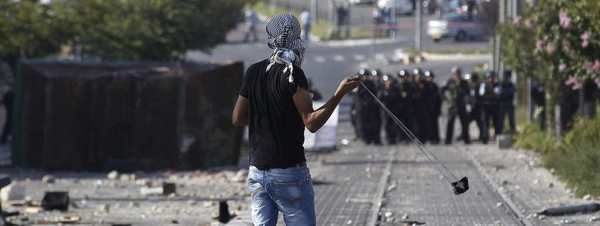State of Israel
The Third Intifada is developing in Jerusalem
31/10/2014

The Third Intifada is developing in Jerusalem
Jerusalem has turned into one of the key settings of the conflict between Israelis and Palestinians. The summary execution of a young Palestinian and the subsequent decision of Prime Minister Benjamin Netanyahu, to close access to the Esplanade of the Mosques, are only the most recent expressions from an extensive history of violence and oppression by the State of Israel. During the week that is coming to an end, Jerusalem was a setting of an escalation of tensions and confrontations.
On Wednesday night, Yehudah Glick, an Israeli-American rabbi, known for leading a campaign of nationalist and religious groups, that are demanding for themselves the sacred sites of the Muslims, was shot.
Yesterday, during a violent raid on Arab neighborhoods, the Israeli security forces murdered a young Palestinian suspected of being the alleged attacker.
That was followed by the measure taken by the Israeli government of closing the Esplanade of the Mosques and deploying an enormous security operation. Netanyahu said they were facing a "terrorist act," encouraged by the Palestinian President, M. Abbas, and he compared the Palestinian resistance organizations to the reactionary Islamic State, that has unleashed a wave of terror in Syria and Iraq. To add fuel to the fire, setters and right-wing Jewish groups are threatening to march on the Old City. Even for the well-behaved Palestinian Authority, this is a "Declaration of War."
These actions seem to repeat the provocation of the late Ariel Sharon, who decided to "visit" the Esplanade and, with this action, let loose the Second Intifada, of the year 2000.
This new escalation takes place in the context of an increasingly complex regional and geopolitical situation. Relations between Netanyahu and the US government are going through a crisis: the Obama administration refused to meet with the Israeli Defense Minister, because of his offensive remarks against Kerry. And, in a publication, remarks of US officials in high positions, who referred to Netanyahu as a coward, became known. These heated words do not have strategic consequences. For the United States, neither the unconditional alliance with Israel nor the generous financial and military aid that it provides for Israel, is in question. But that does not mean that certain policies of Netanyahu, like the permanent extension of the colonists’ settlements in Palestinian territories, the military actions like that in Gaza, or the hard line towards Iran, will be relatively dysfunctional for the aims of the United States, plunged into a double war in Iraq and Syria.
Towards a new uprising?
In the most recent months, Jerusalem has appeared to be the stage where a new Palestinian popular uprising is developing. At least, this is what the press, both Israeli and international, has been stating. They call it "the silent intifada," "the Children’s Intifada," or simply, "the Third Intifada." With some differences in days, they put as its date of birth July 2 this year, when the Palestinian teenager M. Abu Khudair, kidnapped by a group of settlers, who set fire to him while he was still alive, was brutally murdered.
This gruesome crime, together with the 51 days of bombing by air and land, in the Gaza Strip, let loose an unstoppable wave of mobilizations, especially of young people and children, who, with stones and Molotov cocktails, are confronting the Israeli security forces almost daily. One of the targets of the attacks is the high-speed train, with which the settlers cross the Arab neighborhoods, while the Palestinians cannot travel. For this very reason, it has become a symbol of the occupation and of Israel’s attempt to consolidate Jerusalem as the "one and indivisible capital" of its state.
The most interesting thing about this new, embryonic uprising is that, at least in one fundamental aspect, it recalls the First Intifada. As in 1987, the traditional leadership of the PLO has practically no control over these young people. Nor does Hamas, virtually shut up in the Gaza Strip ghetto. An unintended consequence of Israeli policy itself: during the First Intifada, the Palestinian nationalist leadership was in exile. Now, because of the fence of colonists’ settlements, Jerusalem is isolated from the General Headquarters of the Palestinian Authority at Ramallah, which gives rise not only to unknown local leaders, but to a dangerous spontaneity that worries both sides, and, against which, Israel’s only policy is to escalate repression.
It is not even possible to know with certainty whether this wave of protests and mobilizations will give rise, or not, to a new popular uprising. The political results of the "Protective Edge" operation do not coincide with the military ones. While the State of Israel came off badly, internationally discredited for having perpetrated another massacre, without achieving any strategic goal, the Palestinian resistance has come out strengthened. That is, conditions appear to be more than ripe for a new explosion.













